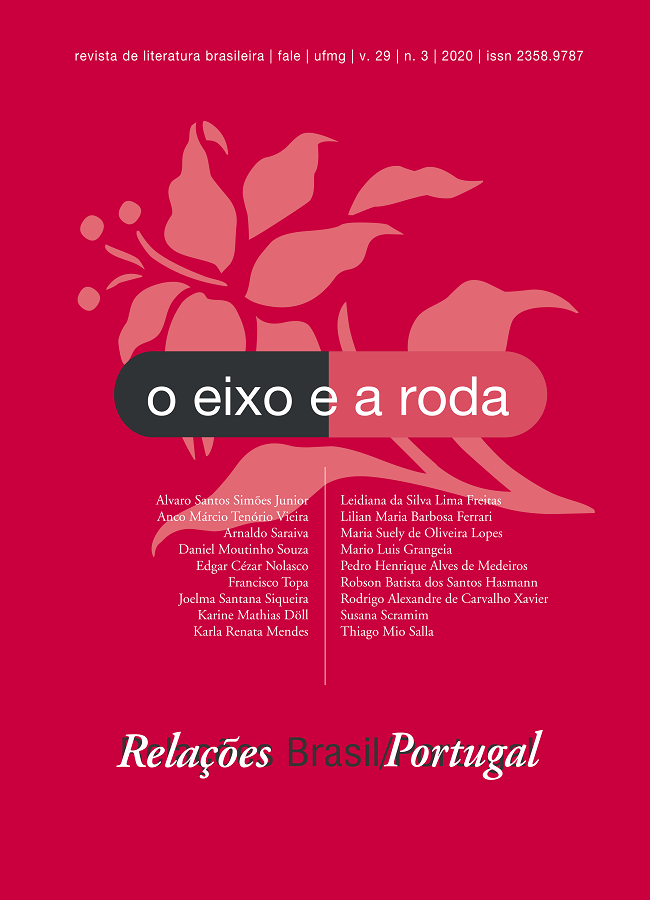Entre negritude e pertencimento
a escrita insurgente de Carolina Maria de Jesus em Diário de Bitita
DOI:
https://doi.org/10.17851/2358-9787.29.3.244-259Palabras clave:
escrita, negritude, pertencimento, Diário de BititaResumen
A presença do negro no cenário literário brasileiro vem se tornando mais visível nas últimas décadas. Embora no passado esse protagonismo tenha sido mais tímido, principalmente quando se trata da mulher negra, essa presença hoje é bastante expressiva. Carolina Maria de Jesus, apesar do preconceito e da discriminação, é uma das muitas escritoras afrodescendentes que conseguiu destaque no meio literário. Através de sua escrita, mostrou a situação de pobreza, de miséria e de exclusão que sofreu durante sua vida. Dessa forma, o presente artigo objetiva analisar a obra Diário de Bitita (1986), enfocando aspectos como a negritude e o pertencimento. De forma específica, buscou-se entender como a questão racial e a ideia de pertencimento são abordadas na referida obra, além de discutir como Carolina de Jesus lidava com essas questões na sua infância e adolescência. Para tanto, buscou-se como auxílio os aportes teóricos de Cixous (2017), Fanon (2008), Hall (2005), entre outros. Observou-se, através desta análise, que a escrita de Carolina Maria de Jesus é um instrumento utilizado pela escritora para denunciar a situação dos pobres e, principalmente dos negros, diante de uma sociedade dominada por uma concepção eurocêntrica que privilegia os brancos em detrimento dos negros. Diante do preconceito, da discriminação e da exclusão vivenciados por Bitita, muitas vezes ela desejava ter a pele branca para assim poder usufruir dos mesmos direitos de que dispunham os brancos.
Referencias
BUTLER, Judith. Relatar a si mesmo: crítica da violência ética. Tradução de Rogério Bettoni. Belo Horizonte: Autêntica Editora, 2015.
CIXOUS, Hélène. O riso da Medusa. In: BRANDÃO, Izabel et al. (org.). Traduções da cultura: perspectivas críticas feministas (1970-2010). Florianópolis: EDUFAL; Editora da UFSC, 2017. p. 129-155.
CUTI. Quem tem medo da palavra negro. Revista Matriz, Porto Alegre, 2010.
FANON, Frantz. Pele negra, máscaras brancas. Tradução de Renato da Silveira. Salvador: EDUFRA, 2008. DOI: https://doi.org/10.7476/9788523212148.
GOMES, Nilma Lino. Alguns termos e conceitos presentes no debate sobre relações raciais no Brasil: uma breve discussão. Geledés: Instituto da Mulher Negra, [s. l.], 13 mar. 2017. Disponível em: https://www.geledes.org.br/alguns-termos-e-conceitos-presentes-no-debate-sobre-relacoes-raciais-no-brasil-uma-breve-discussao/. Acesso em: 29 jan. 2020.
HALL, Stuart. A identidade cultural na pós-modernidade. 10. ed. Tradução de Tomaz Tadeu da Silva e Guaracira Lopes Louro. Rio de Janeiro: DP&A, 2005.
JESUS, Carolina Maria de. Diário de Bitita. Rio de Janeiro: Nova Fronteira, 1986.
JESUS, Carolina Maria de. Quarto de despejo: diário de uma favelada. 10. ed. São Paulo: Ática, 2014.
LOPES, Maria Suely de Oliveira. Literatura afro-brasileira em sala de aula: questões identitárias no conto Incidente na Raiz, de Cuti. In: SOUZA, Élio Ferreira de; FILHO, Feliciano José Bezerra (org.). Literatura afro-brasileira e africana. Teresina: EDUFPI, 2019. p. 47-56.
MEIHY, José Carlos Sebe Bom; LEVINE, Robert M. Cinderela Negra: a saga de Carolina Maria de Jesus. 2. ed. Sacramento, MG: Editora Bertolucci, 2015.
MIRANDA, Fernanda Rodrigues de. Os caminhos literários de Carolina Maria de Jesus: Experiência marginal e construção estética. 2013. 153 f. Dissertação (Mestrado em Letras) – Faculdade de Filosofia, Letras e Ciências Humanas da Universidade de São Paulo, São Paulo, 2013. DOI: https://doi.org/10.11606/D.8.2013.tde-13112013-100432.
MUNANGA, Kabengele. Negritude: usos e sentidos. 3. ed. Belo Horizonte: Autêntica, 2019.
NASCIMENTO, Elisa Larkin. O sortilégio da cor: identidade, raça e gênero no Brasil. São Paulo: Summus, 2003.
SÁ, Janaína da Silva; FERNANDEZ, Raffaella Andrea; TOLEDO, Christiane Vieira Soares. “Minha escrita é uma arma” – Diários insubmissos de Carolina Maria de Jesus. In: SILVA, Raimunda Celestina Mendes (org.). História, Literatura e Linguística: experiências e reflexões. Rio de Janeiro: Caetés, 2019. p. 49-61.
SANTOS, Miriam Rosa dos. História de reencontro: ancestralidade, pertencimento e enraizamento na descoberta de ser negra. 2014. 130 f. Dissertação (Mestrado em Psicologia Social) – Instituto de Psicologia, Universidade de São Paulo, São Paulo, 2014. DOI: https://doi.org/10.11606/D.47.2014.tde-03102014-113719.
SILVA, Tomaz Tadeu da. A produção social da identidade e da diferença. In:______. (org.). Identidade e diferença: a perspectiva dos estudos culturais. 11. ed. Petrópolis: Vozes, 2012. p. 73-102.
SOUZA, Élio Ferreira de. Poesia negra: Solano Trindade e Langston Hughes. Curitiba: Appris, 2017.










